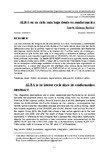Mostrar el registro sencillo del ítem
ALBA en su ciclo más bajo desde su conformación
| dc.rights.license | http://creativecommons.org/licenses/by-nc-sa/3.0/ve/ | |
| dc.contributor.author | Altmann Borbón, Josette | |
| dc.date.accessioned | 2014-05-21T10:49:16Z | |
| dc.date.available | 2014-05-21T10:49:16Z | |
| dc.date.issued | 2014-05-21T10:49:16Z | |
| dc.identifier.issn | 1856-349X | |
| dc.identifier.uri | http://www.saber.ula.ve/handle/123456789/38541 | |
| dc.description.abstract | Los mecanismos de integración se encuentran en crisis, fracturados y debilitados por una clara dinámica de desarrollo donde el Sur cada vez se aleja más del Norte latinoamericano. En la política regional hay tirantez por posiciones estrictamente ideológicas donde ALBA define a la Alianza del Pacifico como el «enemigo», consecuencia que inhibe aún más a la integración y tensiona el diálogo político, consecuencia que impacta negativamente en UNASUR y CELAC, los dos principales foros políticos regionales. Ya desde 2010 ALBA muestra una agenda menos activa que la desarrollada hasta 2009, y luego de la muerte del Presidente Hugo Chávez no se vislumbra un liderazgo evidente en torno a los principios que organizaron al mecanismo, a pesar del acuerdo de plantear una nueva zona económica complementaria al MERCOSUR y al CARICOM en el marco de la II Cumbre Extraordinaria ALBA-TCP–Petrocaribe, efectuada los días 16 y 17 de diciembre en Caracas. | es_VE |
| dc.language.iso | es | es_VE |
| dc.rights | info:eu-repo/semantics/openAccess | |
| dc.subject | ALBA | es_VE |
| dc.subject | Venezuela | es_VE |
| dc.subject | Regionalismo | es_VE |
| dc.subject | Integración | es_VE |
| dc.subject | América Latina | es_VE |
| dc.title | ALBA en su ciclo más bajo desde su conformación | es_VE |
| dc.title.alternative | ALBA is its lowest cycle since its conformation | es_VE |
| dc.type | info:eu-repo/semantics/article | |
| dc.description.abstract1 | The integration mechanisms are in crisis, weakened and fractured by an evident dynamic development where the south is moving away from the northern Latin America. In the regional politics, there is tension due to strictly ideological positions where the ALBA defines the Pacific Alliance as the «enemy», consequence that inhibits furthermore the integration process and tensions the political dialog, result that impacts negatively in the UNASUR and CELAC, the two main political forums of the region. Since 2010, the ALBA has shown a less active agenda as to the one developed until 2009, and after the death of Hugo Chavez there is no perceptible leadership in reference to the principles that organized the integration mechanism, despite the agreement to conform a new commercial zone complementary to the MERCOSUR and the CARICOM under the II Extraordinary Summit ALBA-TCPPetrocaribe, held in Caracas on the 16th and 17th of December. | es_VE |
| dc.description.colacion | 71-80 | es_VE |
| dc.description.email | josette.altmann@gmail.com | es_VE |
| dc.description.frecuencia | semestral | |
| dc.identifier.depositolegal | l.f.07620053303358 | |
| dc.subject.facultad | Núcleo Táchira (NUTULA) | es_VE |
| dc.subject.keywords | Regionalism | es_VE |
| dc.subject.keywords | Integration | es_VE |
| dc.subject.publicacionelectronica | Cuadernos sobre Relaciones Internacionales, Regionalismo y Desarrollo | |
| dc.subject.seccion | Cuadernos sobre Relaciones Internacionales, Regionalismo y Desarrollo: Artículos | es_VE |
| dc.subject.tipo | Revistas | es_VE |
| dc.subject.unidadinv | Centro de Estudios de Fronteras e Integración (CEFI) | es_VE |
| dc.type.media | Texto | es_VE |
Ficheros en el ítem
Este ítem aparece en la(s) siguiente(s) colección(ones)
-
Cuadernos sobre Relaciones Internacionales, Regionalismo y Desarrollo - Vol. 008, No. 016
Julio - Diciembre 2013


